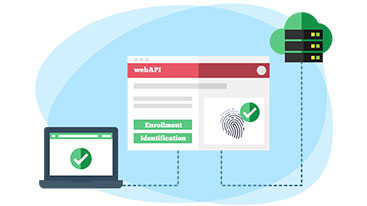How Are Mobile Apps Able to Increase The Efficiency of Biometric Machines?
With the world getting more connected and digital, cybersecurity is paramount. Hackers can hack a network, and cause massive damage by shutting down important digital coordination systems. Hence computer systems are required to have robust and high-level security authentication. Even in organizations that spend millions of dollars for security, a password is always the weakest link in the entire chain. This is where biometric systems can play a major role in boosting the security of cyber systems.

Compared to a password, a system based on fingerprint or iris recognition has a 1 in billion chances of getting hacked. Biometric devices present in the market are security identification and authentication machines. These devices use automated methods that use physiological characteristics such as facial images, Iris prints, fingerprints, and voice recognition to identify a living person. They include improving the efficiency in fraud reduction and convenience of routine access transactions. It also helps in enhancing national security and public safety.
With the advent of the fingerprint sensor and facial recognition systems in the latest iPhones and Android smartphones, Mobile app development companies are exploring various mobile applications for biometric systems. Mobile phone technology, with its native provision of front-facing cameras, touch-sensitive screens and microphones is the central focal point for the implementation of these applications, in so-called “multi-modal” biometric systems.
Secure payments
In smartphones today, thumbprint recognition has become accessible for users. Various banks have integrated this feature into their banking mobile application. The fingerprint sensor also called touchID in iPhone can be integrated to unlock the banking app and authorize payments. This added layer of security prevents the ability of people from looking over the shoulders of others and hack passwords. Since the user does not have to remember the password or type something, it is more convenient and user-friendly.
Privacy protection
Everyone is prone to privacy attacks. You might have kept your personal pictures and videos and then you realize that someone has looked at them or have taken a copy with them. The case is much worse in the case of stolen phones. When you have a biometric password you can relax and rest assured that the mobile phone can never be hacked and your data is secure even when your phone is not.
Secure entry
In organizations, confidential data are available in different departments. When the organization is big, it is difficult to know who is the authorized person, whether he should be in that department, does he have the proper access etc. With the help of mobile application for biometric systems, the security can be fortified and stealing of patent information and intellectual property can be prevented. It can also be used for payroll management and Human resource management.
Passport operations
International security and peace are being hampered by terrorists increasingly. They are easily able to do forgery and cross international borders posing as someone else. If they can be identified by a reliable method, then that would be a huge help for a country’s internal security. One way to do it is to index the terrorists’ biometric information in a central database and then they can be validated every time with the help of a mobile application. Smart gates are available in airports that can use facial recognition to identify a passenger and his/her country of origin.
Banking account management
Biometric mobile applications link every transaction to the user and with a fingerprint swipe customers can easily access services at bank branches. Sensitive information about the customers can be prevented from being accessed by unauthorized employees. It also creates a robust audit trail for every transaction. With the help of this system, insider fraud is eliminated and improves accountability and enforces legal compliance.
HIPAA compliance
With remote health care being a potential game-changer in the future, biometric applications are necessary to safeguard the clinical information of patients. The Health Insurance Portability and Accountability Act, HIPAA is a standard for protecting sensitive patient data. It is mandatory that the company dealing with the health information of the patient ensures all the required network, physical and process security measures are implemented. Mobile apps also help to authorize the doctors securely while treating patients. It can be implemented in large-scale hospital chains with integration to patient information and helps in accurate identification of the patient and retrieve the proper medical history with ease.
Conclusion
Mobile applications for biometric devices are set to revolutionize the cybersecurity world. However with the advent of technology, criminals are also evolving rapidly finding loopholes such as fingerprint spoofing with the help of counterfeit mold and advanced hacking mechanisms etc. in an increasingly mobile world, it is necessary to have investments in research and development of advanced mobile solutions for biometric devices.
One of the future advancements would be the implementation of “Live” biometric solutions. In this case, in addition to fingerprint sensors, other biometric details such as measurement of blood characteristics and body temperature of the individual. The image of the person can be matched with the voice modulation in some other cases. These advancements will surely help in the development of a secure and safe world.
Author Bio: James Grills is a technical writer with a passion for writing on emerging technologies in the areas of mobile application development and IoT technology. He is a marketing advisor – currently associated with Cumulations Technologies a mobile app development company in India.













